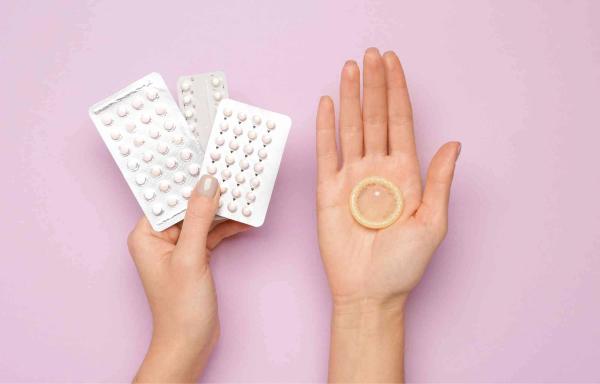Contraception and STIs
Contraceptives prevent unwanted pregnancy, and in some cases protect you from sexually transmitted infections (STIs). The choice of contraception should feel easy and safe. What type of contraception that suits you best can vary with age and stage of life.
We help you with advice and guidance, so you can find the right contraception for you.
Book appointment
Hormonal or non-hormonal contraception?
Contraception is an important part of reproductive health, and there are a number of types to choose from to prevent unwanted pregnancy. Most contraceptives contain hormones that prevent ovulation or sperm penetration, but not everyone can or wants to use hormonal contraceptives.
Read more about how the various contraceptives work, and what are the advantages and disadvantages of them.

IUD and implants
IUDs and contraceptive implants are long-acting contraceptives, and they can be used by all women – including those who have not given birth. They protect very well against unwanted pregnancy, because there is no risk of using them incorrectly. Both the coil and the P-rod must be inserted and removed by healthcare personnel.

Birthcontrol pills
For many women, the birth control pill is synonymous with contraception, and it is still the most widely used contraceptive in Norway. Birth control pills have a positive effect on menstrual pain and amount of bleeding. There are several different types of birth control pills on the market, and they are today very safe to use.

Emergency contraception
Emergency contraception is medication that can prevent pregnancy if you have had unprotected sex or experienced contraceptive failure. They mainly work by delaying ovulation, and must be used as soon as possible after intercourse. The copper IUD is the safest emergency contraception we have today.

Sexually Transmitted Infections (STIs)
Condoms are the only contraceptive that also protects you from sexually transmitted diseases. Therefore, you should use a condom when you have sex with a new partner – even if you are already using other contraception.
Here you can read more about the most common venereal diseases, and how you can get tested.

What is a spiral?
An IUD is a small, T-shaped device that is inserted into the uterus to prevent pregnancy. It can be hormonal or copper-based and provides long-term contraception for up to 5-10 years, depending on the type
What is a spiral?
An IUD is a small, T-shaped device that is inserted into the uterus to prevent pregnancy. It can be hormonal or copper-based and provides long-term contraception for up to 5-10 years, depending on the type
How does a hormonal IUD work?
A hormonal IUD releases small amounts of the hormone levonorgestrel, which thickens the cervical mucus and thins the uterine lining. This prevents sperm from reaching the egg and prevents the egg from attaching to the uterus.
How does a hormonal IUD work?
A hormonal IUD releases small amounts of the hormone levonorgestrel, which thickens the cervical mucus and thins the uterine lining. This prevents sperm from reaching the egg and prevents the egg from attaching to the uterus.
What is the difference between a hormonal IUD and a copper IUD?
A hormonal IUD releases hormones to prevent pregnancy, while a copper IUD uses copper, which is toxic to sperm, preventing fertilization. Hormonal IUDs can also reduce menstrual bleeding, while copper IUDs can make them heavier.
What is the difference between a hormonal IUD and a copper IUD?
A hormonal IUD releases hormones to prevent pregnancy, while a copper IUD uses copper, which is toxic to sperm, preventing fertilization. Hormonal IUDs can also reduce menstrual bleeding, while copper IUDs can make them heavier.
How is an IUD inserted?
En spiral settes inn av en gynekolog under en kort prosedyre på kontoret. Innsettingen kan være litt ubehagelig, men det tar vanligvis bare noen få minutter.
How is an IUD inserted?
En spiral settes inn av en gynekolog under en kort prosedyre på kontoret. Innsettingen kan være litt ubehagelig, men det tar vanligvis bare noen få minutter.
What are birth control pills?
Birth control pills are a type of hormonal birth control that is taken daily to prevent pregnancy. They contain either a combination of estrogen and progestin, or only progestin.
What are birth control pills?
Birth control pills are a type of hormonal birth control that is taken daily to prevent pregnancy. They contain either a combination of estrogen and progestin, or only progestin.
How do birth control pills work?
Birth control pills work by preventing ovulation, thickening the cervical mucus to prevent sperm from reaching the egg, and thinning the uterine lining to prevent the egg from attaching.
How do birth control pills work?
Birth control pills work by preventing ovulation, thickening the cervical mucus to prevent sperm from reaching the egg, and thinning the uterine lining to prevent the egg from attaching.
What are the most common side effects of birth control pills?
Common side effects of birth control pills include nausea, headache, weight gain, breast tenderness and mood swings. Most side effects subside after a few months.
What are the most common side effects of birth control pills?
Common side effects of birth control pills include nausea, headache, weight gain, breast tenderness and mood swings. Most side effects subside after a few months.
What is a birth control patch?
A birth control patch is a small, skin-colored patch that is attached to the skin and releases hormones to prevent pregnancy. The patch is changed weekly
What is a birth control patch?
A birth control patch is a small, skin-colored patch that is attached to the skin and releases hormones to prevent pregnancy. The patch is changed weekly
How does the birth control patch work?
The contraceptive patch releases a steady amount of estrogen and progestin through the skin and into the bloodstream, which prevents ovulation and thickens the cervical mucus.
How does the birth control patch work?
The contraceptive patch releases a steady amount of estrogen and progestin through the skin and into the bloodstream, which prevents ovulation and thickens the cervical mucus.
What is a contraceptive injection?
A contraceptive injection is a hormonal contraceptive method that is given as an injection every three months. It contains progestin which prevents ovulation and thickens the cervical mucus.
What is a contraceptive injection?
A contraceptive injection is a hormonal contraceptive method that is given as an injection every three months. It contains progestin which prevents ovulation and thickens the cervical mucus.